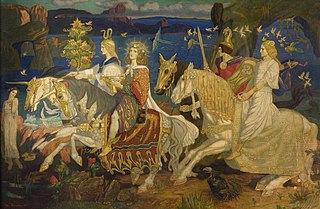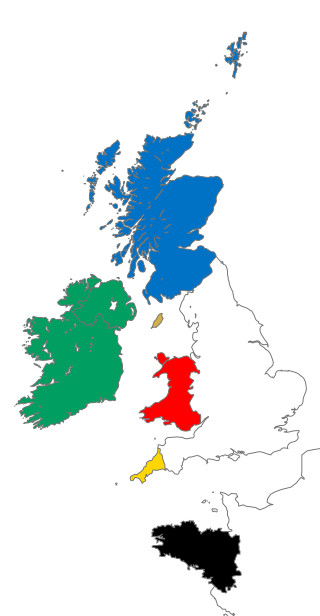
The Celtic languages are a branch of the Indo-European language family, descended from Proto-Celtic. The term "Celtic" was first used to describe this language group by Edward Lhuyd in 1707, following Paul-Yves Pezron, who made the explicit link between the Celts described by classical writers and the Welsh and Breton languages.

The Celts or Celtic peoples were a collection of Indo-European peoples in Europe and Anatolia, identified by their use of Celtic languages and other cultural similarities. Major Celtic groups included the Gauls; the Celtiberians and Gallaeci of Iberia; the Britons, Picts, and Gaels of Britain and Ireland; the Boii; and the Galatians. The interrelationships of ethnicity, language and culture in the Celtic world are unclear and debated; for example over the ways in which the Iron Age people of Britain and Ireland should be called Celts. In current scholarship, 'Celt' primarily refers to 'speakers of Celtic languages' rather than to a single ethnic group.

Irish mythology is the body of myths indigenous to the island of Ireland. It was originally passed down orally in the prehistoric era. In the early medieval era, myths were written down by Christian scribes, who Christianized them to some extent. Irish mythology is the best-preserved branch of Celtic mythology.
In Welsh mythology and folklore, Cŵn Annwn, singular Ci Annwn, were the spectral hounds of Annwn, the otherworld of Welsh myth. They were associated with a form of the Wild Hunt, presided over by either Arawn, king of Annwn in Pwyll Pendefig Dyfed, the First Branch of the Mabinogi and alluded to in Math fab Mathonwy the Fourth Branch of the Mabinogi, or by Gwyn ap Nudd as the underworld king and king of the fair(y) folk is named in later medieval lore.

A torc, also spelled torq or torque, is a large rigid or stiff neck ring in metal, made either as a single piece or from strands twisted together. The great majority are open at the front, although some have hook and ring closures and a few have mortice and tenon locking catches to close them. Many seem designed for near-permanent wear and would have been difficult to remove.
The modern Celts are a related group of ethnicities who share similar Celtic languages, cultures and artistic histories, and who live in or descend from one of the regions on the western extremities of Europe populated by the Celts.

Pan-Celticism, also known as Celticism or Celtic nationalism is a political, social and cultural movement advocating solidarity and cooperation between Celtic nations and the modern Celts in Northwestern Europe. Some pan-Celtic organisations advocate the Celtic nations seceding from the United Kingdom and France and forming their own separate federal state together, while others simply advocate very close cooperation between independent sovereign Celtic nations, in the form of Breton, Cornish, Irish, Manx, Scottish, and Welsh nationalism.

In Celtic mythology, the Otherworld is the realm of the deities and possibly also the dead. In Gaelic and Brittonic myth it is usually a supernatural realm of everlasting youth, beauty, health, abundance and joy. It is described either as a parallel world that exists alongside our own, or as a heavenly land beyond the sea or under the earth. The Otherworld is usually elusive, but various mythical heroes visit it either through chance or after being invited by one of its residents. They often reach it by entering ancient burial mounds or caves, or by going under water or across the western sea. Sometimes, they suddenly find themselves in the Otherworld with the appearance of a magic mist, supernatural beings or unusual animals. An otherworldly woman may invite the hero into the Otherworld by offering an apple or a silver apple branch, or a ball of thread to follow as it unwinds.

The Celts: Rich Traditions and Ancient Myths is a 1987 documentary series that examines the origins, growth, and influence of Celtic culture in Great Britain and throughout Europe.

Ancient Celtic religion, commonly known as Celtic paganism, was the religion of the ancient Celtic peoples of Europe. Because there are no extant native records of their beliefs, evidence about their religion is gleaned from archaeology, Greco-Roman accounts, and literature from the early Christian period. Celtic paganism was one of a larger group of polytheistic Indo-European religions of Iron Age Europe.

Brigantia or Brigindo was a goddess in Celtic religion of Late Antiquity.

The Celtic nations or Celtic countries are a cultural area and collection of geographical regions in Northwestern Europe where the Celtic languages and cultural traits have survived. The term nation is used in its original sense to mean a people who share a common identity and culture and are identified with a traditional territory.

Ancient Celtic warfare refers to the historical methods of warfare employed by various Celtic people and tribes from Classical antiquity through the Migration period.
Miranda Jane Aldhouse-Green, is a British archaeologist and academic, known for her research on the Iron Age and the Celts. She was Professor of Archaeology at Cardiff University from 2006 to 2013. Until about 2000, she published as Miranda Green or Miranda J. Green.

Cân i Gymru is a Welsh-language television talent competition that is broadcast annually on S4C. It was first introduced in 1969 when BBC Cymru wanted to enter the Eurovision Song Contest. The winner of the contest represents Wales at the annual Pan Celtic Festival held in Ireland and is also awarded a cash prize.
Christopher Knowles is an American comic book artist, writer and blogger who writes on comic books and broader pop culture topics.
John Thomas Koch is an American academic, historian, and linguist who specializes in Celtic studies, especially prehistory, and the early Middle Ages. He is the editor of the five-volume Celtic Culture: A Historical Encyclopedia. He is perhaps best known as the leading proponent of the Celtic from the West hypothesis.

Celtic mythology is the body of myths belonging to the Celtic peoples. Like other Iron Age Europeans, Celtic peoples followed a polytheistic religion, having many gods and goddesses. The mythologies of continental Celtic peoples, such as the Gauls and Celtiberians, did not survive their conquest by the Roman Empire, the loss of their Celtic languages and their subsequent conversion to Christianity. Only remnants are found in Greco-Roman sources and archaeology. Most surviving Celtic mythology belongs to the Insular Celtic peoples. They preserved some of their myths in oral lore, which were eventually written down by Christian scribes in the Middle Ages. Irish mythology has the largest written body of myths, followed by Welsh mythology.
Juliette Wood is a British historian and lecturer at Cardiff University. She specializes in Celtic and Medieval history, magic, and folklore. She is a former director of the Folklore Society and an Honorary Fellow of Amgueddfa Cymru – Museum Wales.

The Celts is a 2000 television documentary series produced by Opus Television for the Welsh channel S4C. A book adaptation of the same name by John Davies was published in the same year by Cassell & Co. Also in that year, the programme was sold to the American cable network Celtic Vision.











